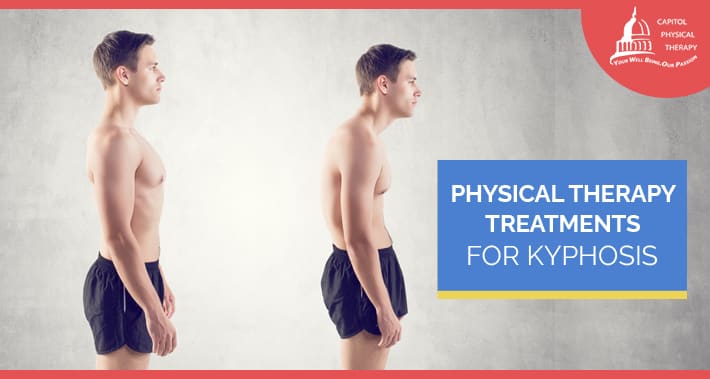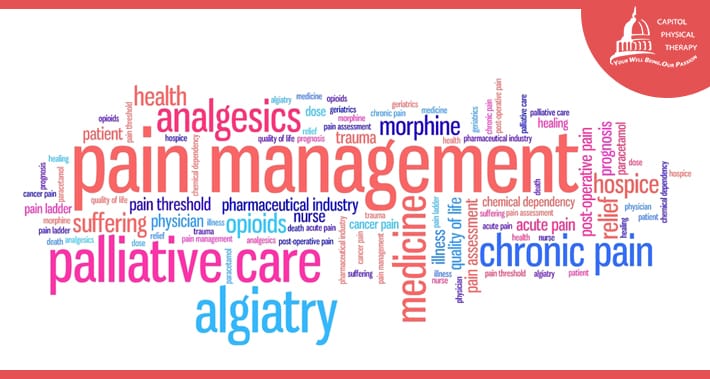
Are you often told not to slouch, but you find that you can’t adjust your posture even when you try really hard?
Have you noticed that your spine appears to be hunched or curved near the top?
Are you experiencing back pain, rounded shoulders, or breathing difficulties?
If so, you may have kyphosis.
But what is kyphosis, and what can you do if you have it?
We offer gait training physical therapy here at Capitol Physical Therapy that can help with kyphosis.
Keep reading to find out more.
What Is Kyphosis?
Kyphosis is a health condition which causes an excessive curvature in your upper spine.
The condition is also sometimes known as “hunchback” or “roundback”.
A healthy spine is naturally curved in the neck, upper back, and lower back areas.
According to the American Academy of Orthopedic Surgeons, spines typically have a natural curve of approximately 20 to 45°.
This curved shape helps absorb shock and support the weight of your head, and is what is referred to when we talk about good posture.
But when this natural arch is larger than normal, it’s called kyphosis.
If you have kyphosis, you may have a visible hump on your upper back, which may also be visible from the side.
This makes it, in a way, the opposite of hyperlordosis, where your lower back has the excessive curvature
What Are The Symptoms Of Kyphosis?
The most noticeable symptom of kyphosis is the appearance of a rounded back.
It’s not a change that you’d recognize immediately, but rather something that occurs gradually.
For this reason, it’s possible that your friends and family may notice before you do.
You might also notice that your clothes fit differently over time, or that it takes an increasing amount of effort to stand or sit up straight.
If you notice a sudden increase in the curvature of your back, book an appointment with a physical therapist as soon as possible.
Early intervention is incredibly important because a sudden change in the curve of the spine could be a sign of another health problem, such as osteoporosis.
Since kyphosis doesn’t typically cause chronic pain except in severe cases, it’s a good idea to get your condition treated before it gets to this point.
What Causes Kyphosis?
Kyphosis can affect people of any age; however, it becomes more common as you age.
It usually first appears in adults 40 and over.
As a result, physical therapy for seniors tends to be more likely to focus on kyphosis the older a patient gets.
Poor posture also plays a major role.
Kyphosis from poor posture is called postural kyphosis.
Muscle weakness in the upper back, arthritis or other bone degeneration diseases, osteoporosis, osteopenia, or other losses of bone density can also cause kyphosis.
RELATED: Wolff’s Law And How Your Bones Grow
It’s also possible for spinal injuries, herniated discs, and scoliosis to lead to kyphosis.
RELATED: Physical Therapy Treatments For Sciatica
What Is Hyperkyphosis?
Hyperkyphosis is the medical term for a spinal curve that measures greater than 40°.
A doctor can diagnose hyperkyphosis with a visual inspection of your back and then by measuring your spinal curve with a flexible ruler or X ray.
Your doctor might ask for imaging tests like further X rays or an MRI scan of that part of your back to determine whether you have a more uncommon problem that’s affecting your posture.
In advanced hyperkyphosis, you may have trouble breathing even in the absence of heart or lung disease.
You may also notice that there is lessening of the distance between your lowest ribs and your pelvic bones.
In this case, the functionality of your lungs may be tested to measure whether your hyperkyphosis is restricting your breathing.

How Can Physical Therapy Treat Kyphosis?
Physical therapy can help kyphosis in a number of different ways.
A physical therapist can help rehabilitate the postural changes associated with kyphosis, as well as approach the condition holistically by reviewing your medical history.
They will have a conversation with you about the challenges you’re experiencing now and can work with your primary physician on a treatment plan for you.
If you’re interested in possible treatment plans, keep reading.
1. Postural Alignment Exercises
In a 2018 study by Katzman et al., it was concluded that spine strengthening and posture training exercises are effective forms of treatment for kyphosis.
Postural alignment exercises are particularly helpful.
Postural alignment exercises refer to stretching and strengthening exercises helpful in reducing spinal curvature, decrease pain, and prevent your condition from advancing.
These exercises are designed for you to be able to do them at home while going about your daily life.
Your physical therapist can help show you how to preform these exercises in a safe and effective way.
2. Pain Management
Your physical therapist can provide a variety of options for pain management, and you’ll be able to choose one that works for you and meets your needs.
Common methods of pain management used in physical therapy include:
- Heat and cold therapy
- Dry needling
- Electrical stimulation
You’ll have the opportunity to work with your physical therapist to determine which option work best for you.
3. Gait Training
Gait training is the practice of strengthening your walking.
It’s often accompanied by physical therapy for balance.
Both methods increase your endurance and can improve your safety by reducing the risk of falls.
4. Education
The more you know about kyphosis, the better positioned you are to make decisions that you know are best for your body and health.
Your physical therapist can help you learn more about your condition and supply you with in depth resources and knowledge that you can’t get anywhere else.
Your physical therapist can teach you how to safely get in and out of bed, in and out of the bathtub, or out of a chair, and how to bend and walk with more ease.
Book Your Appointment With Capitol Physical Therapy Today
If you’d like to get started on a path to better managing your kyphosis or hyperkyphosis, we can help.
In your first appointment, you’ll meet with one of our qualified DC physical therapists who has experience and training in working with kyphosis.
Your physical therapist will ask you questions to learn more about your specific posture and movement goals, and to get to know you and your medical history.
This is so they can put together a treatment plan with the best exercises for you to do at home.
From there, you’ll meet with your physical therapist regularly so that they can administer therapy at the clinic and so they can help track your progress.
Be sure to bring any questions you have about kyphosis or about the treatment process, and your physical therapist will be happy to answer them.
Book your appointment with Capitol Physical Therapy today, and let’s start working on your health goals.
1331 H St NW #200,
Washington, DC 20005
- https://g.page/capitolptdc
9560 Pennsylvania Ave. # 202,
Upper Marlboro, MD 20772
- https://goo.gl/maps/zjL4NnnuThRhrcS86
Capitol Physical Therapy offers orthopedic and other pain related solutions, with our versitile team of physical therapists in Washington, DC